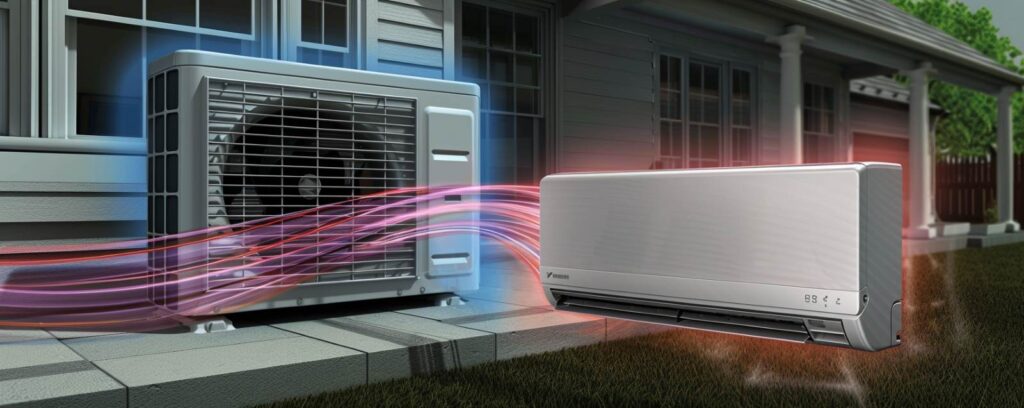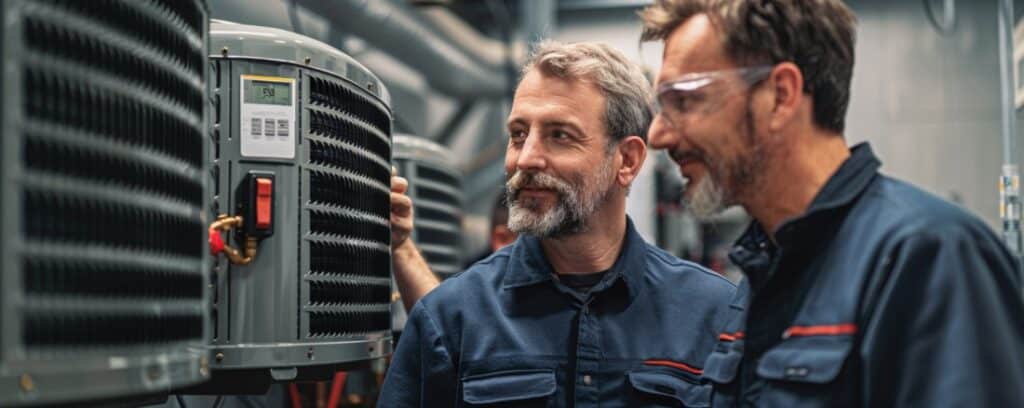- Overview of Skilled Trades: HVAC Techs, Electricians, and Plumbers
- Job Outlook for HVAC Technicians, Electricians, and Plumbers
- Regional Insights: Electrician, Plumber, and HVAC Salaries by State
- Factors Affecting Salaries Across Skilled Trades
- Benefits and Perks Beyond Salary for HVAC Technicians, Electricians, and Plumbers
- How to Choose Between HVAC, Electrician, or Plumbing Careers
- Final Considerations: Making the Best Career Choice in the Skilled Trades
Choosing a career in the skilled trades can be a life-changing decision, especially when weighing factors like salary, job outlook, and personal interests. Among the most popular and in-demand trades are HVAC technicians, electricians, and plumbers. Each of these professions plays a critical role in maintaining and improving modern infrastructure, and the salary prospects for each can significantly impact career decisions.
By understanding how electrician vs. plumber vs. HVAC salary compares, you can identify which trade aligns with your financial goals and long-term career aspirations.
Overview of Skilled Trades: HVAC Techs, Electricians, and Plumbers
Skilled trades like HVAC technicians, electricians, and plumbers are vital to the functioning of homes, businesses, and industries. Each of these professions requires specialized training and skills, making them critical components of the workforce. With growing demand for tradespeople and the increasing complexity of building systems, these careers offer solid job prospects and competitive salaries.
HVAC Technicians
HVAC technicians install, maintain, and repair heating, ventilation, and air conditioning systems. These systems are essential for climate control in homes and commercial buildings. HVAC techs must understand how to troubleshoot complex equipment, handle refrigerants, and ensure systems meet safety and environmental standards. Because HVAC systems are integral to comfortable living and working environments, the demand for HVAC technicians is expected to remain strong.
Electricians
Electricians are responsible for installing and maintaining electrical systems, which are necessary for nearly every aspect of modern life. From wiring new buildings to repairing malfunctioning systems, electricians ensure that electrical power flows smoothly and safely. They may also work on renewable energy systems such as solar panels, making the role increasingly important as more homes and businesses adopt sustainable energy solutions.
Plumbers
Plumbers install and repair pipes that carry water, gas, and other fluids in residential, commercial, and industrial settings. They are also tasked with maintaining systems such as waste removal and water distribution. In addition to the basic functions, plumbers often work on intricate piping systems in hospitals, factories, and high-rise buildings. This complexity makes plumbing a trade that requires attention to detail and technical expertise.
Understanding electrician vs. plumber vs. HVAC salary is crucial for those interested in these fields, as salary plays a significant role in career planning. Prospective students and professionals in these trades should consider how their skills align with the demands and salary prospects of each profession.
Salary Comparisons: Electrician vs. Plumber vs. HVAC Tech
When considering a career in the skilled trades, salary is often one of the most significant factors influencing decision-making. The earning potential for HVAC technicians, electricians, and plumbers varies based on experience, location, and the specific tasks required in each profession. To provide clarity, we’ll break down the average salaries for each trade based on the most recent data from the U.S. Bureau of Labor Statistics (BLS) in 2023.
HVAC Technicians’ Salary
According to the BLS, the average annual salary for HVAC technicians in 2023 was approximately $57,300. This figure can vary widely depending on factors like certification, region, and specialization. HVAC technicians who focus on complex commercial or industrial systems tend to earn more than those working primarily in residential settings.
Electricians’ Salary
The BLS reports that the average annual salary for electricians in 2023 was around $61,590. Electricians who have completed apprenticeships and hold advanced certifications tend to earn on the higher end of this spectrum, especially if they work in specialized fields such as industrial or renewable energy systems.
Plumbers’ Salary
In 2023, the BLS recorded the average annual salary for plumbers at approximately $61,550. Plumbers who specialize in areas such as pipefitting or steamfitting may see even higher earnings, particularly if they work on complex projects in industrial or commercial settings.
In comparing electrician vs. plumber vs HVAC salary, electricians tend to have a slight edge in average earnings, but the gap can close or widen depending on specific factors like location, certifications, and the complexity of the work involved. Each of these trades offers competitive pay, making them viable options for those seeking to enter the skilled trades workforce.
| Median Salary | Lowest 10% | Highest 10% | |
| Electricians | $61,590 | $38,470 | $104,180 |
| Plumbers | $61,550 | $38,690 | $103,140 |
| HVAC technicians | $57,300 | $37,270 | $84,250 |
Job Outlook for HVAC Technicians, Electricians, and Plumbers
When choosing between careers in the skilled trades, it’s essential to consider the job outlook for each profession. Over the next decade, the demand for HVAC technicians, electricians, and plumbers is expected to grow steadily. This section explores the job outlook for each trade based on projections from the U.S. Bureau of Labor Statistics (BLS) for 2023 through 2033.
HVAC Technicians Job Outlook
The demand for HVAC technicians is projected to grow by 9% between 2023 and 2033, which is much faster than the average for all occupations. Several factors are driving this growth, including the increasing complexity of climate control systems and the rising demand for energy-efficient solutions. As more homes and businesses seek to upgrade or replace outdated HVAC systems, the need for skilled HVAC technicians is expected to remain strong.
Additionally, as environmental regulations evolve, HVAC technicians who are knowledgeable about green technologies and energy-efficient systems will be in particularly high demand. These specialized skills not only boost job prospects but can also lead to higher earnings in the long run.
Electricians Job Outlook
Electricians are expected to see 11% job growth rate from 2023 to 2033, which is also much faster than the average for all occupations. The ongoing construction of new homes, commercial buildings, and infrastructure is a significant driver of demand for electricians. Moreover, the increasing focus on renewable energy sources such as solar and wind power means that electricians with experience in installing and maintaining these systems will have an edge in the job market.
In addition to traditional roles, electricians who work with cutting-edge technologies like smart homes and electric vehicle charging stations will find ample opportunities for growth. These trends are expected to sustain demand for skilled electricians well into the future.
Plumbers Job Outlook
Plumbers are projected to experience a 6% job growth rate from 2023 to 2033, which is faster than the average for all occupations. The need for plumbers will continue to rise as buildings age and require maintenance, repairs, and upgrades to their plumbing systems. Additionally, ongoing new construction projects, especially in rapidly growing regions like the South and West, will fuel demand for plumbers.
Plumbers who specialize in fields such as pipefitting or steamfitting may see even stronger job prospects, as these skills are in high demand for large commercial and industrial projects. Overall, while the growth rate for plumbers is slightly slower than that of electricians, the steady demand for plumbing services ensures job stability in the field.
Is HVAC a good career ? What about jobs for electricians and plumbers? Based on current job demand projections, the outlook is promising across the board. Each trade offers solid job security and opportunities for specialization, which can enhance long-term career prospects.
| Trade | 10-year Job Growth Outlook |
| Electricians | 11% |
| Plumbers | 6% |
| HVAC technicians | 9% |
Regional Insights: Electrician, Plumber, and HVAC Salaries by State
Salaries for HVAC technicians, electricians, and plumbers can vary widely depending on the state and region in which they work. Factors such as local demand, cost of living, and specialized industries all contribute to regional wage differences. Below, we explore how salaries for these trades differ across various states, based on data from the U.S. Bureau of Labor Statistics (BLS) as of May 2023.
HVAC Technicians Salaries by State
The employment and salaries of HVAC technicians vary significantly based on geographic location. States with extreme climates, high demand for HVAC services, and large populations tend to offer higher wages for HVAC technicians. Here are some insights into HVAC employments as some of the highest HVAC salaries across the US :
- Florida leads the nation in HVAC technician employment, with 37,370 jobs, representing 3.91 jobs per thousand. The state’s HVAC techs earn an average annual wage of $52,220.
- California also ranks high, with 35,630 HVAC jobs. However, the state’s techs enjoy higher average wages of $70,050 annually, driven by high demand and a higher cost of living.
- Texas ranks third in employment with 31,910 jobs and an average annual salary of $54,640.
- New York HVAC techs earn $68,950 on average, with employment concentrated in large metropolitan areas.
- Pennsylvania employs 18,980 HVAC techs, who earn an average annual salary of $58,920.
States with the highest concentration of HVAC jobs include Delaware, Idaho, and Florida, where employment per thousand jobs and location quotients reflect high demand for these skilled workers.
For example:
- Delaware reports a location quotient of 1.62, and HVAC techs there earn an annual mean wage of $64,180.
- Idaho ranks high in employment concentration, with HVAC techs earning $50,350 per year.
Electricians Salaries by State
Electricians are essential in nearly every state, with large populations and active construction industries driving demand for their services. Here’s how electrician salaries and employment levels stack up by region:
- California leads in electrician employment with 72,880 workers earning an average annual wage of $84,330.
- Texas employs 70,580 electricians, who earn $56,350 annually, reflecting a lower cost of living compared to California.
- New York electricians earn $83,550 per year, with high employment levels in urban centers.
- Florida employs 46,690 electricians, with an average wage of $52,380.
- Ohio offers an average annual wage of $64,360 for its 24,430 electricians.
States like Wyoming and North Dakota have the highest concentration of electrician jobs relative to their populations, offering hourly wages around $32.69 and $35.02 respectively.
Top-paying states for electricians include:
- District of Columbia: Annual mean wage of $88,860.
- Washington: Annual mean wage of $88,620.
- Hawaii: Annual mean wage of $88,280.
Plumbers Salaries by State
Plumbers, pipefitters, and steamfitters also see wide salary variation based on geographic region. The states with the highest employment levels for plumbers are often those with large populations and high construction activity:
- California leads with 42,480 plumbers earning an average annual wage of $75,300.
- Texas follows closely, employing 41,890 plumbers who earn $56,890 annually.
- New York plumbers are among the highest-paid in the nation, with an average annual salary of $84,890.
- Florida plumbers earn an average of $51,830, with strong employment levels due to the state’s ongoing construction boom.
- Illinois plumbers enjoy some of the highest wages, earning $88,420 per year.
States with the highest concentration of plumber jobs include Hawaii, Massachusetts, and Rhode Island, all offering hourly wages well above the national average. For example:
- Hawaii plumbers earn an average annual wage of $74,860.
- Massachusetts plumbers are among the highest paid, with annual wages averaging $89,140.
Top-paying states for plumbers include:
- New Jersey: Annual mean wage of $97,690.
- Massachusetts: Annual mean wage of $89,140.
- Illinois: Annual mean wage of $88,420.
By understanding the regional variations in wages and employment for HVAC technicians, electricians, and plumbers, prospective students can better assess where their skills are most in demand and where they can expect the best compensation. Whether you’re drawn to Florida’s booming construction market, California’s high demand for skilled labor, or Massachusetts’ competitive wages, each state offers unique opportunities for tradespeople.
| Trade Top Employment | State Top Employment | Level Top Annual Wage | State | Top Annual Wage |
| HVAC Technicians | Florida | 37,370 | California | $70,050 |
| Electricians | California | 72,880 | District of Columbia | $88,860 |
| Plumbers | California | 42,480 | New Jersey | $97,690 |
Factors Affecting Salaries Across Skilled Trades
Several factors can influence the salaries of HVAC technicians, electricians, and plumbers. While experience and location are key determinants, other elements like certifications, specialization, and union affiliation also play a significant role in shaping earning potential. This section will explore how these factors impact salaries across the trades.
Experience and Certifications
As in many professions, experience is one of the most important factors affecting salary. HVAC technicians, electricians, and plumbers with several years of experience often command higher wages due to their advanced knowledge and skills. Employers are willing to pay more for experienced workers who can complete tasks efficiently and handle complex challenges.
Certifications also play a critical role in boosting earnings. For HVAC technicians, certifications such as EPA Section 608 (refrigerant handling) or NATE (North American Technician Excellence) certification can lead to higher pay. Electricians who complete apprenticeships and achieve journeyman or master electrician status can significantly increase their earning potential. Plumbers who obtain specialized certifications, such as those for pipefitting or medical gas systems, often see a notable boost in their salaries.
Specializations within the Trades
Specialization within the trades can greatly impact salary prospects. HVAC technicians who focus on commercial or industrial systems tend to earn more than those working exclusively in residential settings. Commercial systems are often more complex, requiring specialized knowledge and training, which justifies higher wages.
For electricians, working in fields such as industrial electrical systems or renewable energy can offer higher pay. As solar energy, wind power, and smart grid technologies become more prevalent, electricians with the skills to install and maintain these systems are in high demand, often commanding premium salaries.
Plumbers who specialize in areas like pipefitting or steamfitting, or those who work on large-scale projects in industries like construction or manufacturing, tend to earn higher wages. These specialized skills are in high demand, especially in commercial and industrial settings, where precision and expertise are essential.
Union vs. Non-Union Work
Union membership is another key factor that can influence salaries in the skilled trades. Unionized electricians, plumbers, and HVAC technicians often enjoy higher wages, better benefits, and more job security than their non-union counterparts. Union contracts typically set minimum wage standards, ensure regular pay increases, and provide comprehensive benefits packages.
While non-union workers may have more flexibility in terms of job opportunities, union members are often protected by collective bargaining agreements that ensure fair wages and working conditions. This can be particularly important in areas where the cost of living is high or where job opportunities fluctuate based on economic conditions.
Benefits and Perks Beyond Salary for HVAC Technicians, Electricians, and Plumbers
While salary is a key consideration when choosing a career, it’s important to remember that HVAC technicians, electricians, and plumbers often enjoy additional benefits and perks that go beyond their paychecks. These non-salary advantages can significantly contribute to job satisfaction and long-term career success. In this section, we’ll explore some of the common benefits and perks in these skilled trades.
Job Stability and Security
One of the major perks of working in the skilled trades is job stability. HVAC technicians, electricians, and plumbers are always in demand, regardless of economic conditions. These trades are essential for maintaining and improving infrastructure, meaning that job opportunities remain steady even during downturns in other sectors. This stability is particularly valuable for those looking for long-term employment with minimal risk of layoffs or industry disruption.
For example, HVAC technicians are needed year-round to install, maintain, and repair heating and cooling systems. Similarly, electricians and plumbers are critical for both new construction projects and ongoing maintenance in homes and businesses. This demand ensures steady work and strong career prospects for years to come.
Benefits Packages
In addition to salary, many employers offer comprehensive benefits packages that can include health insurance, retirement plans, and paid time off. Unionized workers in particular often receive robust benefits that contribute to overall compensation. For instance, union contracts typically guarantee health coverage, pension contributions, and vacation time, which can enhance job satisfaction and financial security.
While benefits packages can vary between unionized and non-unionized workers, many employers in the skilled trades recognize the importance of offering benefits to attract and retain qualified workers. Whether you’re an HVAC technician, electrician, or plumber, benefits can play a significant role in your overall compensation and quality of life.
Career Advancement Opportunities
Another perk of working in the skilled trades is the potential for career advancement. Many tradespeople can move into higher-paying roles by gaining experience, pursuing additional certifications, or taking on leadership positions. For example, HVAC technicians may become supervisors or start their own businesses, while electricians and plumbers can advance to become master tradespeople or even contractors.
For those interested in entrepreneurship, the skilled trades offer ample opportunities to start a business. With the right combination of experience, certifications, and networking, HVAC technicians, electricians, and plumbers can establish their own companies, allowing for greater independence and earning potential.
Flexibility and Work-Life Balance
The skilled trades often offer a degree of flexibility that can lead to a better work-life balance. Many tradespeople have the option to work for themselves as independent contractors, allowing them to set their own schedules and choose their projects. This flexibility is particularly attractive to individuals who want to balance work with family responsibilities or other commitments.
Even for those who work for an employer, the demand for skilled labor often means workers can negotiate favorable hours or take on additional projects to increase their income. The ability to control your schedule is a significant perk in the skilled trades that isn’t always available in more rigid career paths.
How to Choose Between HVAC, Electrician, or Plumbing Careers
Selecting a career in the skilled trades is a major life decision, and with options like HVAC technician, electrician, and plumber, it can be challenging to determine which path is the best fit. Each of these professions offers a unique combination of skills, job opportunities, and earning potential. To help guide your decision, we’ll explore the key factors to consider when choosing between these trades.
Personal Interests and Skills
One of the most important factors in choosing a career is aligning it with your personal interests and skills. Each trade requires a different set of strengths and preferences, and understanding your natural aptitudes can help you thrive in your chosen field.
- HVAC Technicians: If you enjoy working with complex systems, troubleshooting issues, and staying up to date with the latest technology, a career as an HVAC technician might be a good fit. HVAC techs often work on intricate heating and cooling systems, making this career ideal for people who enjoy problem-solving and hands-on work with mechanical systems.
- Electricians: A career as an electrician may appeal to those who are detail-oriented and enjoy working with wiring and electrical components. Electricians need a strong understanding of electrical systems and the ability to follow safety protocols closely. If you have an interest in technology, renewable energy, or smart home systems, becoming an electrician could be a rewarding career choice.
- Plumbers: Plumbers work on water and gas piping systems, which require a strong understanding of fluid dynamics and building codes. This trade is well-suited for individuals who enjoy working with their hands and solving practical problems. Plumbers also often work in a variety of settings, from residential homes to large commercial buildings, making this a versatile career.
Job Outlook and Salary Prospects
When choosing a trade, it’s important to consider the job outlook and salary prospects for each profession. As we’ve discussed earlier, each trade has solid demand, but job growth and salary can vary based on location and specialization.
- Electricians currently have the highest projected job growth and average salary among the three trades. This career may be the best choice for individuals seeking both job security and earning potential, especially those interested in specialized fields like industrial systems or renewable energy.
- Plumbers also enjoy strong job prospects, especially in areas with aging infrastructure or rapid construction growth. Specializing in pipefitting or steamfitting can further increase salary potential.
- HVAC Technicians will continue to be in demand as climate control systems become more advanced and energy-efficient. Those who focus on green technologies or work in commercial settings may have higher earning potential.
Education and Training Requirements
The education and training requirements for each trade vary, but all three typically require a combination of formal education and on-the-job training through apprenticeships or vocational programs.
- HVAC Technicians: HVAC training programs are widely available at community colleges and trade schools, and many technicians pursue certifications such as EPA Section 608. Apprenticeships provide hands-on experience, and continuing education is often required to stay current with new technologies and regulations.
- Electricians: Most electricians complete an apprenticeship, which combines classroom instruction with paid on-the-job training. Electricians are also required to pass state licensure exams and may need to pursue continuing education to stay up-to-date with electrical codes and technologies.
- Plumbers: Similar to electricians, plumbers typically go through an apprenticeship, which provides both practical experience and classroom education. Plumbers may also need to obtain state licensure, depending on the regulations in their area. Specialized training for pipefitting or steamfitting may be required for those pursuing these fields.
Career Flexibility and Advancement Opportunities
Each of these trades offers significant flexibility and advancement opportunities. As you gain experience, you can choose to specialize, move into supervisory roles, or even start your own business.
- HVAC Technicians: As an HVAC technician, you can choose to focus on either residential or commercial systems, or specialize in areas like refrigeration or energy-efficient technologies. Experienced HVAC techs may also move into management roles or start their own HVAC businesses.
- Electricians: Electricians can advance from journeyman to master electrician status, which opens up opportunities for higher pay and leadership roles. Many experienced electricians also start their own contracting businesses, allowing for more independence and potentially higher earnings.
- Plumbers: Plumbers can specialize in areas such as pipefitting or steamfitting, which can lead to higher salaries. Like electricians, plumbers can also pursue advancement by becoming licensed master plumbers or starting their own plumbing companies.
Final Considerations: Making the Best Career Choice in the Skilled Trades
Now that we’ve explored the salary prospects, job outlook, and career growth opportunities for HVAC technicians, electricians, and plumbers, it’s time to reflect on what matters most when choosing a career in the skilled trades. This decision goes beyond comparing electrician vs. plumber vs HVAC salary—it’s about identifying the path that aligns best with your skills, interests, and long-term goals.
Aligning Career with Personal Interests
When selecting between HVAC, electrical work, or plumbing, it’s important to think about the tasks and skills that excite you most. Ask yourself:
- Do you enjoy troubleshooting mechanical systems and working on complex climate control systems? If so, HVAC technician could be the right choice.
- Are you more interested in understanding electrical currents and installing advanced wiring systems for buildings? Then, a career as an electrician might suit you best.
- Do you prefer working with water, gas, and piping systems, solving practical problems in construction and repairs? In that case, plumbing may be the ideal trade for you.
Weighing Job Security and Regional Opportunities
Beyond personal preferences, consider the job stability and regional demand for each trade in your area. Some regions may have higher demand for certain trades:
- Urban areas with high construction rates often need more electricians and plumbers to support infrastructure development.
- Areas with extreme climates may have a greater need for HVAC technicians to manage heating and cooling systems.
It’s also worth looking into regional salary trends to see how the earning potential for each trade varies depending on where you plan to work.
Planning for Long-Term Growth and Flexibility
Each of these trades offers significant opportunities for career advancement and specialization. Whether you’re aiming to start your own business, become a master in your field, or explore niche areas like renewable energy or energy-efficient systems, you’ll have the ability to shape your career over time. Choosing between a career as an HVAC technician, electrician, or plumber requires careful consideration of your interests, skills, and career goals. While each trade offers solid salaries, job security, and advancement opportunities, the right choice ultimately depends on what excites and motivates you in your work. By understanding the strengths and rewards of each trade, you’ll be able to make an informed decision that sets you up for long-term success in the skilled trades.




